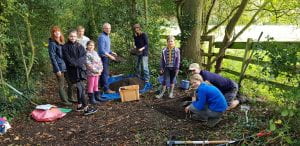 In the UK rural settlement has long been an important area of research for medieval archaeologists (Gerrard 2003; Christie and Stamper 2012), and many deserted and shrunken rural settlements have been archaeologically investigated, using a range of techniques. However, medieval settlements which did not become permanently depopulate have been somewhat overlooked. As CORS represent c. 90% of all medieval settlements, this is problematic. Recently, TPE in scores of CORS across the country has shown the technique to be very effective in reconstructing individual settlement development (Gerrard and Aston 2008; Jones and Page 2008; Morris 2017), and in aggregate has revealed the impact of global phenomena such as the Black Death (Lewis 2016). CARE-MSoC will set these studies in their continental context and improve the capacity of community-sourced excavation to contribute to local and regional heritage management and national narratives (Hedge and Nash 2016)
In the UK rural settlement has long been an important area of research for medieval archaeologists (Gerrard 2003; Christie and Stamper 2012), and many deserted and shrunken rural settlements have been archaeologically investigated, using a range of techniques. However, medieval settlements which did not become permanently depopulate have been somewhat overlooked. As CORS represent c. 90% of all medieval settlements, this is problematic. Recently, TPE in scores of CORS across the country has shown the technique to be very effective in reconstructing individual settlement development (Gerrard and Aston 2008; Jones and Page 2008; Morris 2017), and in aggregate has revealed the impact of global phenomena such as the Black Death (Lewis 2016). CARE-MSoC will set these studies in their continental context and improve the capacity of community-sourced excavation to contribute to local and regional heritage management and national narratives (Hedge and Nash 2016)
In the UK community archaeology is well-established and well-funded by organisations such as the Heritage Lottery Fund (Maeer 2017) with thousands taking part each year (Thomas 2010) and its capacity to contribute to academic research and heritage asset management increasingly recognised (Hedge and Nash 2016). However, it still needs to increase its reach and diversity to reach teenagers, young adults and those in lower socio-economic groups (DCMS, 2010: 8-14, 33-39; Gadsby & Chidester, 2012). It also needs to improve its ability to evidence its outcomes and to work in a truly interdisciplinary manner to achieve wider social aims, improving synergies with disciplines such as psychology, digital humanities, community work, education and psychogeography (Isherwood 2012, Lewis 2015).
